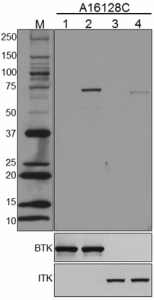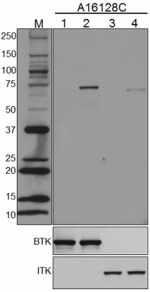- Clone
- A16128C (See other available formats)
- Regulatory Status
- RUO
- Other Names
- Bruton’s tyrosine kinase, Bruton agammaglobulinemia tyrosine kinase, AGMX1, ATK, IMD1, PSCTK1, XLA, BPK
- Isotype
- Mouse IgG1, κ
- Ave. Rating
- Submit a Review
- Product Citations
- publications

-

Total cell lysates (15 µg protein) from Ramos cells treated without (lane 1) or with (lane 2) 2 mM H2O2 for three minutes, and Jurkat cells treated without (lane 3) or with (lane 4) the same stimulation were resolved by 4-20% Tris-Glycine gel electrophoresis, transferred to nitrocellulose, and probed with 2 µg/mL (1:250) purified anti-BTK/ITK Phospho (Tyr223/Tyr180) antibody (Clone A16128C). Proteins were visualized by chemiluminescence detection using HRP goat anti-mouse-IgG. Equal BTK and ITK loading were confirmed using pan antibodies (1 µg/mL, 1:500 dilution) against the respective proteins. -

Human peripheral blood lymphocytes were treated with (left), or without (right) Hydrogen Peroxide for 5 minutes, fixed with Fixation Buffer, permeabilized with Intracellular Staining Permeabilization Wash Buffer, then stained with CD20 (clone 2H7) APC and purified anti-BTK Phospho (Tyr223)/ITK Phospho (Tyr180) (Clone A16128C). Followed by anti-mouse IgG1, κ PE.
| Cat # | Size | Price | Quantity Check Availability | Save | ||
|---|---|---|---|---|---|---|
| 605201 | 25 µg | 90€ | ||||
| 605202 | 100 µg | 212€ | ||||
Bruton’s tyrosine kinase (BTK) is a Tec family kinase that plays a critical role in B cell development. Upon B cell receptor engagement, BTK translocates to the plasma membrane, where it is transphosphorylated by LYN and SYK kinases at Tyr551. This initial phosphorylation event is followed by autophosphorylation at Tyr223. Phosphorylated Tyr223 is proposed to serve as a docking site for other proteins containing an SH2 domain. Downregulation of BTK activity is achieved through phosphorylation at Ser 180 by PKCβ, which results in reduced membrane recruitment and concomitant transphosphorylation. BTK-mediated B cell receptor signaling is required for B cell survival in the bone marrow and is a therapeutic target for certain B cell malignancies. Mutations in the BTK gene results in X-linked agammaglobulinemia (XLA), a primary immunodeficiency disease characterized by a failure in B cell maturation. Additionally, BTK plays a role in Toll-like receptor signaling in innate immune cells, and has been shown to play a direct role in NLRP3 inflammasome activation, thus contributing to ischaemic brain injury.
Product DetailsProduct Details
- Verified Reactivity
- Human, Mouse
- Antibody Type
- Monoclonal
- Host Species
- Mouse
- Immunogen
- Human BTK peptide phosphorylated at Tyr 223, Complete Freund's adjuvant.
- Formulation
- Phosphate-buffered solution, pH 7.2, containing 0.09% sodium azide.
- Preparation
- The antibody was purified by affinity chromatography.
- Concentration
- 0.5 mg/ml
- Storage & Handling
- The antibody solution should be stored undiluted between 2°C and 8°C.
- Application
-
WB - Quality tested
ICFC - Verified - Recommended Usage
-
Each lot of this antibody is quality control tested by Western blotting. For Western blotting, the suggested use of this reagent is 2.0 ug/mL (1:250 dilution). For intracellular flow cytometric staining, the suggested use of this reagent is 0.25 µg per million cells in 100 µl volume. It is recommended that the reagent be titrated for optimal performance for each application.
- Application Notes
-
Clones A16128C and A16128B (anti-BTK Phospho (Tyr223)) both bind BTK Phospho Tyr223 with similar affinity, but in comparison to clone A16128B, clone A16128C has a much stronger recognition of phosphorylated Tyrosine 180 of ITK by intracellular staining and flow cytometric analysis. ITK is the T cell-specific homolog of BTK that is not found in B cells. Similarly, T cells lack BTK1.
- Application References
-
- Tomlinson MG, et al. 2004. Mol. Cell. Biol. 24: 2455
- RRID
-
AB_2721726 (BioLegend Cat. No. 605201)
AB_2721726 (BioLegend Cat. No. 605202)
Antigen Details
- Structure
- BTK encodes a 659 amino acid protein with a predicted molecular weight of 76.2 kD. Contains a PH domain (a.a. 1-133) that binds phosphatidylinositol (3,4,5)-triphosphate (PIP3) and polyphosphates, an SH3 domain (a.a. 214-274), an SH2 domain (a.a. 281-377), and a protein kinase domain (402-655).
- Distribution
-
Cytosol, plasma-membrane associated, B cells
- Function
- Links B cell receptor engagement with downstream signaling events
- Interaction
- ARID3A, BLNK, CAV1, GNAQ, GTF2I, PLGC2, PRKD1, SH3BP5
- Ligand/Receptor
- PIP3
- Biology Area
- Cell Biology, Signal Transduction
- Molecular Family
- Phospho-Proteins
- Antigen References
-
1. Krysiak K, et al. 2017. Blood. 129:473.
2. Burger JA, et al. 2016. Nat Commun. 7:11589.
3. Wang Q, et al. 2015. Elife. 4:e06074.
4. Ito M, et al. 2015. Nat. Commun. 6:7360.
5. Pillinger G, et al. 2015. Sci. Rep. 5:12949.
6. Cinar M, et al. 2013. Leuk. Res. 37:1271.
7. Doyle SL, et al. 2007 J. Biol. Chem. 282:36953.
8. Nore BF, et al. 2003. Biochem. Biophys. Acta. 1645:123.
9. Li Z, et al. 1997. Proc. Natl. Acad. Sci. 94:13820. - Gene ID
- 695 View all products for this Gene ID
- UniProt
- View information about BTK Phospho Tyr223/ITK Phospho Tyr180 on UniProt.org
Related Pages & Pathways
Pages
Related FAQs
Other Formats
View All BTK Phospho (Tyr223)/ITK Phospho (Tyr180) Reagents Request Custom Conjugation| Description | Clone | Applications |
|---|---|---|
| Purified anti-BTK Phospho (Tyr223)/ITK Phospho (Tyr180) | A16128C | WB,ICFC |
| PE anti-BTK Phospho (Tyr223)/ITK Phospho (Tyr180) | A16128C | ICFC |
Compare Data Across All Formats
This data display is provided for general comparisons between formats.
Your actual data may vary due to variations in samples, target cells, instruments and their settings, staining conditions, and other factors.
If you need assistance with selecting the best format contact our expert technical support team.
-
Purified anti-BTK Phospho (Tyr223)/ITK Phospho (Tyr180)

Total cell lysates (15 µg protein) from Ramos cells treated ... 
Human peripheral blood lymphocytes were treated with (left),... -
PE anti-BTK Phospho (Tyr223)/ITK Phospho (Tyr180)

Human peripheral blood lymphocytes were treated with (left),... 
C57BL/6 mouse splenocytes were treated with (left), or witho...
 Login / Register
Login / Register 







Follow Us